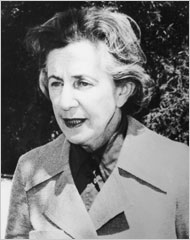Remembering Helen Suzman
 A lovely May day in 1981. Standing — for the first and only time — in my black PhD robe waiting for the Brandeis Commencement festivities to begin. More ambivalent than excited. Not about my imminent departure from the Ivy Tower but about the speaker and honorary degree recipient, Helen Suzman, who died in Johannesburg yesterday at the age of 91.
A lovely May day in 1981. Standing — for the first and only time — in my black PhD robe waiting for the Brandeis Commencement festivities to begin. More ambivalent than excited. Not about my imminent departure from the Ivy Tower but about the speaker and honorary degree recipient, Helen Suzman, who died in Johannesburg yesterday at the age of 91.
I admired Suzman’s guts. One of a handful of anti-apartheid members of the South African Parliament, this daughter of Jewish immigrants was the only woman ever to visit Nelson Mandela and his fellow political prisoners on Robben Island. On the other hand, having been active in the divestiture movement at college, I found myself sympathetic to the university’s African American students, who objected to bestowing an honor on someone they believed was aiding and abetting the apartheid regime. The tension of that day 28 years ago came back when I read the obituary in today’s New York Times:
“She differed sharply with more radical campaigners inside and outside South Africa who were supportive of economic sanctions to press the country’s white rulers toward reform, saying sanctions would hurt poor blacks more than whites. To Mrs. Suzman’s frustration, this led some of her critics to say she was unwittingly helping to prolong apartheid. This was a variation on a critique she had long endured, and to some extent accepted — that by engaging in what was largely a charade of parliamentary politics in apartheid South Africa, she became complicit, however unwillingly, in the larger deceits of apartheid, which would ultimately be ended not by a small band of white dissenters, but by the more powerful forces of the black freedom struggle and external political pressure.”
And so it was ultimately ended, and she was at Nelson Mandela’s side in 1996 when, as South Africa's first black president, he signed the new constitution. And did I stand along with the protesters who turned their backs as Helen Suzman rose to speak? I thought of Bishop Tutu, who undoubtedly knew an ally of apartheid when he saw one and was a staunch supporter of Mrs. Suzman. I thought, too, of the respect I owed a woman – a Jewish woman at that – who had the courage to take on P.W. Botha. And I stayed in my seat.





